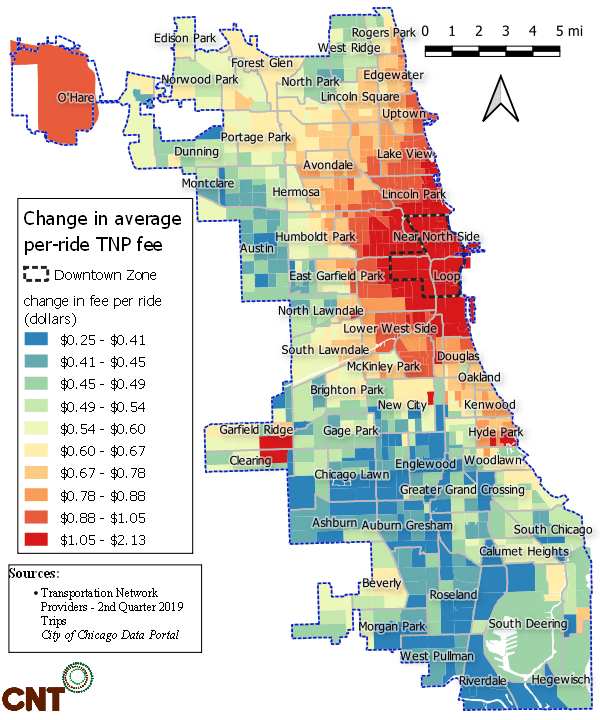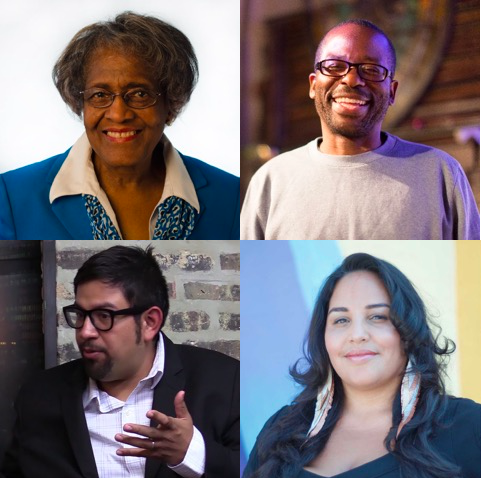
Uber and Lyft have been treating Mayor Lori Lightfoot's new ride-hail tax proposal, which goes before the City Council for a final vote on Tuesday, like an existential threat.
Currently the total city fee on Uber and Lyft is a flat $0.72, regardless of where, when, and how you use the services. But last month Lightfoot announced the plan to slightly lower the tax on shared, non-downtown Uber Pool and Lyft Line trips to $0.65. The fee on private neighborhood rides would be $1.25, an increase of $0.53, or roughly the price of a round of pinball.
The tax on shared trips that start or end downtown during peak hours (6 a.m. to 10 p.m. on weekdays) would also go up to $1.25. And the fee on private, usually solo, downtown peak-hour trips -- the worst kind of rides in terms of clogging traffic in the Loop -- would be jacked up to $3.
The goal is to coax Uber and Lyft riders into switching to the more sustainable shared trips or, better yet, back to the CTA, which has seen about 48 million fewer rides per year since ride-hail launched in Chicago in 2014, according to a new city report. This should help prevent bus-slowing traffic jams, especially in the transit-rich Loop, and stop the CTA ridership bleeding, which would eventually lead to service cuts that would leave transit-dependent Chicagoans stranded with worse service than ever. The city projects the new fees will raise $40 million a year, with $2 million earmarked for infrastructure to speed up buses, such as dedicated lanes.
"We're really at a tipping point with the CTA," Lightfoot told me when we rode the Madison Street bus to work together this week. "If we don't do something now to really address this issue, it's going to be a severe problem for the CTA, which is always going to carry more people than any other mode of transport, so we've got to shore up public transportation."
But while less congestion and better transit would be great for Chicago, fewer ride-rail trips, especially lucrative solo downtown rush-hour journeys, would be bad for Uber's and Lyft's bottom lines and set a precedent for other cities to follow Chicago's lead by hiking taxes. (If we capped the number of ride-hail vehicles, which New York City has done, and/or required the companies to pay a higher commission, that would help soften the financial blow for their drivers.)
As such, the companies, especially Uber, have been fighting the mayor's initiative tooth-and-nail, and one of their main arguments is that the new tax would be bad for transportation equity. It's certainly true that ride-hail has been a game-changer for South and West side communities with limited transit access that have often been ignored by traditional taxi companies.
Uber has enlisted 35 African-American ministers to promote their message that Lightfoot's plan would be a regressive tax that would hurt lower-income folks and people of color the most. They've been doing boots-on-the-ground work for the company, appearing at hearings and an Uber-organized protest at City Hall, as well as doing TV and newspaper interviews.
Lightfoot sparked controversy last week when she claimed Uber is “paying off Black ministers" to speak out against the new fees, which the company and the clergy denied. She later walked back that statement a bit, saying she was referring to the company offering the reverends, pastors, and bishops community investments in exchange for their support.
At any rate, it's worth pointing out that all 35 of these ministers made the exact same argument on Uber's behalf back in April, when the company was trying to stop the city from signing a deal with Lyft for citywide expansion of the Divvy system. (That campaign also included Uber purchasing sympathetic coverage on the Black-focused news, arts, and culture website The TRiiBE.) So it is notable that these clergy members have shown a sudden, passionate interest in bike-share and ride-hail equity.
"[Ride-hailing], since its inception... has been a true blessing in our communities,” Pastor William Turner, the leader of the ministers, told Chicago Sun-Times columnist Laura Washington in an interview. He argued that "the congestion tax would hurt folks who rely on ride-hailing for basic transportation needs." Washington went on to write two different op-eds claiming that Lightfoot's plan is inequitable.
However, ridership data doesn't back up that argument. The city's ride-hail study found that while about 70 percent of Uber and Lyft rides hailed downtown and on the North side are private, most trips requested on the South and West sides are the more affordable shared rides, and 90 percent of them don't involve downtown. Therefore, most South and West siders would pay less under the new structure.
Moreover, a Center for Neighborhood Technology analysis of the data shows that the vast majority of the new revenue would be coming from wealthier parts of town, with little impact on lower-income areas. It's true that, due to the minority of trips hailed on the South and West sides that are private, and the tiny fraction of these rides that go downtown during peak hours, generally taken by more affluent residents, these areas would see a modest average trip tax increase of $0.25 to $0.50. But rides hailed downtown and on the North Side would see an average fee hike of $0.78 to $2.13. So, when you also factor in the fact that lower-income and working-class Chicagoans are more likely to ride buses and benefit from the planned transit improvements, Lightfoot's plan is essentially a social justice-friendly "Robin Hood" tax.

But to double check that I'm not overlooking any racial equity issues that might be off my radar as a non-POC North Sider, I asked some of Chicago's leading mobility justice advocates of color for their opinions of the the mayor's proposal.
Unsurprisingly, CNT vice president for intergovernmental affairs Jacky Grimshaw, who’s Black, is a fan of the initiative. She got her start in the transportation field working for Chicago’s first African-American mayor Harold Washington coordinating relations between the mayor’s office and the local transit agencies. She's also co-chair of the Systems Change working group, and a steering committee member for Elevated Chicago, a coalition that promotes affordable transit-oriented development.
Grimshaw referred me to a video she filmed for Lightfoot’s office voicing support for the plan. “I like it because it’s a disincentive for people to congest, particularly the Loop, with ride-hailing vehicles,” she said in the clip. “And to the extent that people want to use single-occupancy ride-hailing, they should pay an additional cost, because they are impacting our roads and bridges, and they are increasing the pollution of the air.” She added that she believe the proposal will benefit CTA riders, particularly South and West siders who can’t afford Uber and Lyft.
Oboi Reed, who's African American and leads the transportation justice nonprofit Equiticity, said the group isn't taking a formal position on the proposal until it has a chance to conduct its own data study. "Achieving racial equity in Chicago requires an explicit commitment to authentic racial equity, the fair and just distribution of resources, data analysis to determine the related needs of Black and Brown people, strategies to increase related benefits while also reducing related harms, and publicly detailing the racially equitable outcomes being sought," he said.
Reed recommended some tweaks to the plan, including explicitly increasing the tax on trips involving wealthier neighborhoods, and lowering the fee on rides serving lower-income communities and transit stations. He also wants the city to disclose how much of the new CTA revenue will be used in African-American and Latinx communities, provide a monthly "report card" on how the fee structure is impacting racial equity, and commit to adjusting the tax structure if fails to produce the desired effects on equity and congestion.
Julio Rodriguez is the director of the community development corporation of the Northwest Side Housing Center, based in Belmont Cragin, a predominantly Mexican-American, blue-collar Northwest Side neighborhood with no rapid transit service. Rodriguez, who's Latinx, says his organization supports Lightfoot's proposal, since its surveys indicate that few local residents are using Uber and Lyft to access independent businesses, but they do rely on CTA buses. The housing center distributes free Ventra cards to many of its lower-income clients, and it recently completed a community corridors plan called "Avenues for Growth," which looks at ways to leverage transit to boost the local economy.
"Basically, this plan is a good thing, but Uber is trying to manipulate the clergy into not supporting it," Rodriguez said. "I think it's a real farce what Uber is saying about this impacting the business community. This is not going to stop people from spending money at local businesses or going downtown; it will encourage public transit use."
Leslé Honoré, director of Washington Park-based KLEO Community Family Life Center, which focuses on violence prevention through strengthening families, echoed Rodriguez's sentiments. Honoré, the daughter of an African-American father and a Mexican immigrant mother, also serves on the steering committee for Elevated Chicago.
"I was tentative at first," Honoré. "Because it's grounded in so much data, [Lightfoot's plan] can seem very overwhelming if it's not laid out in plain English." But she said that, having learned affluent, majority-white neighborhoods will bear the brunt of the new fees, which will help improve transit for lower-income residents, "I am completely for this."
Like Reed, Honoré said she wants to make sure the new transit funding is concentrated in communities of color, noting that much of the North Side is already well-served by the CTA. "Equity is not something that's going make everyone happy because it requires resources to be focused on people that lack them," she acknowledged. "But making sure we better fund transit in underserved neighborhoods is how we make the city accessible to all of its residents."
And like Rodriguez, Honoré noted that the involvement of the 35 clergy members has clouded the issue. "Faith-based organizations are pillars of their communities," she said. "But people have definitely been getting misinformation from the pastors who are Uber supporters. So helping our clients understand that was inaccurate and showing them the data from the city has been really important."
Update 11/25/19: Logan Square Neighborhood Association lead housing organizer Christian Mariano Diaz provided this statement on the group's position on the ride-hail tax plan. "We applaud Mayor Lightfoot moving us toward a more equitable [ride-hail] tax. This is a good start, but my hope is that in the future the fees will be even lower for Black and Brown communities and higher for those who are well off and I hope more of this revenue will be used to improve public transportation, especially in historically disinvested neighborhoods."






